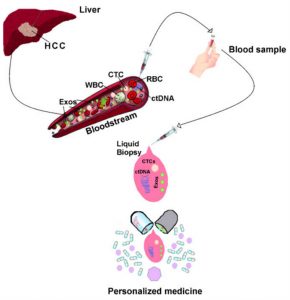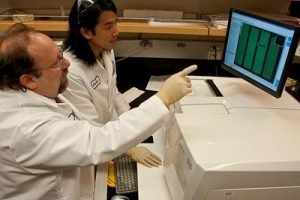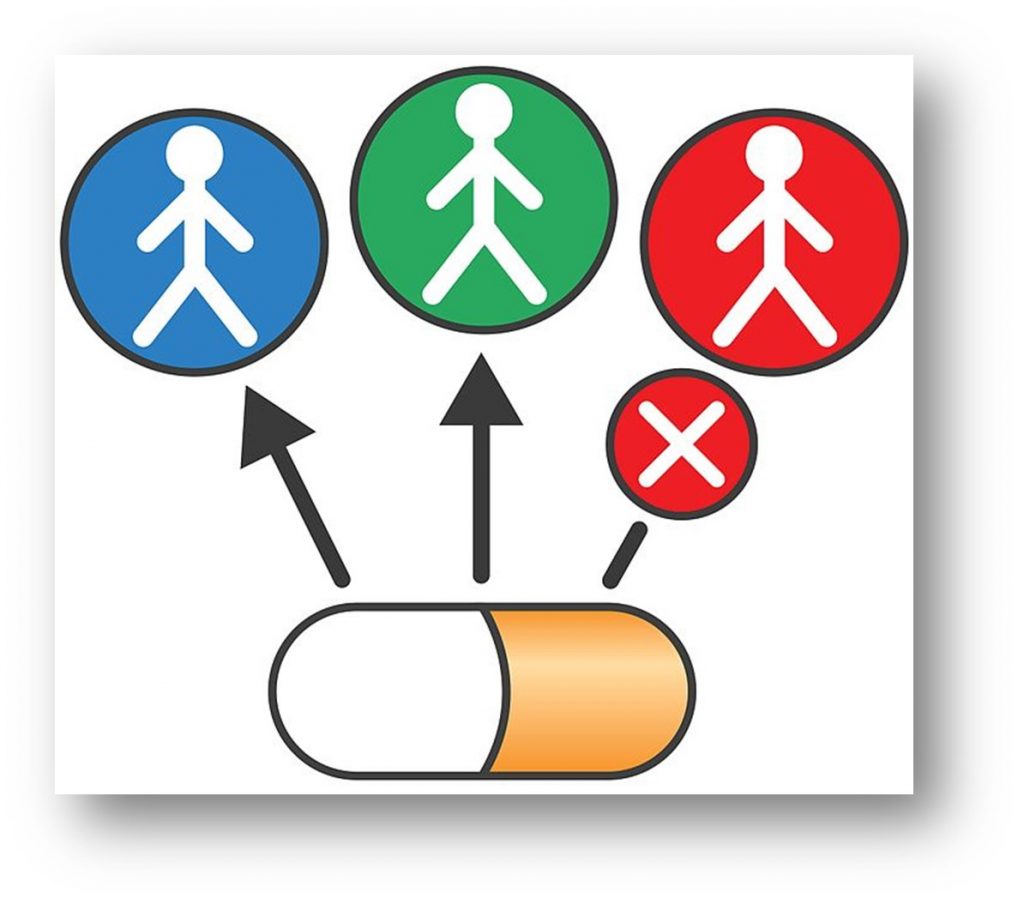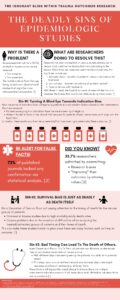Introduction
The area of personalized medicine is still new in the world of medicine but it has shown great potential to help a lot of people. This area of study looks at a patient’s genetic information through genetic screening and doctors can create a personalized treatment plan from that information1. Giving a DNA sample to have looked at to create a personalized treatment plan gives patients an advantage in patients having the ability to take control of their health care. Since the cost of rapid DNA testing is decreasing, and patient information is becoming more digitized it is possible to have the area of personalized medicine can greatly improve public health and lower medical cost so the average person can benefit from it1. There are many great things to come out of the new field of study but there are things that the average adult normally does not know or understand about their genetic information and what happens after it has been analyzed. The genetic technology is not new but is growing there is little information about how genetic information is stored, and how it is being protected from the general public. Since the DNA contains a range of sensitive information from what genetic disease someone is more likely to develop to what alleles are present in a given gene or locus; that sensitive information must be protected. Just as there are laws and regulations in the United States on how sensitive personal information is shared and stored like, social security numbers, there should be the same for the DNA we submit for testing in the medical field and within criminal investigations. There are many good things to come out of personalized medicine that can improve the lives of many people around the world, but there is also the uncertainty of what happens after DNA is sequenced and analyzed. This uncertainty can be dangerous and hurt not only the scientific community by also the general population. Having laws and regulations on genetic testing and storage is crucial to expanding the use of personalized medicine and expanding the world of biomedical research. However, if the scientific community is to grow and benefit from genetic data being shared politicians must think of this situation ethically. What is most important is making sure that if genetic is to be shared then it’s done in a way that benefits and protects the general community and that we all can trust that our information is safely stored .
Benefits Of Personalized Medicine
The main use of personalized medicine is to create treatment strategies based on unique characteristics of the patient through a DNA sample. There are many factors that go into this highly personalized treatment plan like genetic factors but it also includes lifestyle and environmental factors3 . Looking multiple aspects of life that influence a persons’ short-term and long-term health makes these treatment plans more detailed so the patient can get the best treatment for whatever disease or symptom is causing them harm. Getting the proper treatment can mean many things for patients like not relapsing for those who are going through treatments for substance abuse. There has been success in using personalized medicine to identify what

Courtesy of Wikimedia Commons
treatment would work more efficiently for those going through alcohol use disorder. It showed that 37% of patients had a better chance of staying abstinent for 1 year when personalized medicine was used to determine the best treatment plan for each patient4 . In the past there have been many ways to approach AUD treatment so there can be trial and error in finding the right treatment. Instead of going through treatment after treatment with no success of being abstinent from alcohol these patients were given an increased chance of success. These methods have even been used in research for Alzheimer’s disease treatment. The treatment for that disease usually works best if there is early intervention before major symptoms set in. Determining how strong the treatment should be can come as a challenge due to the personal factors effecting treatment efficacy.
Using personalized medicine there was evidence showing it was able to pick out what patients would have a greater response to a stronger treatment5. However, similar types of studies that have been done on Alzheimer’s disease are viewed only as a hypothesis; currently there shows great potential in giving Alzheimer’s patients an increased quality of life through personalized treatment plans. There have been many studies looking at all kinds of diseases and how their treatment plans can be tailored to work more efficiently for each individual patient. With tailored there is less pain and suffering for the patient and their family along with less financial stress. Getting the treatment right the first or second time is more beneficial to the family and patient. As of right now the cost of these genetic screenings and personalized treatment plans are out of range for most individuals. Since it is currently widely unavailable to the general public these treatments can only help a small amount of the population. Once is can be widely available it can show amazing results and growth in the medical community.
Concern For Genetic Data Privacy
Though there has been evidence of human benefit from personally tailored treatment plans there is the risk of genetic information being used without patient consent. The way patient data is organized and stored is regulated through specific context. Whatever is missed in those specific contexts get made up for in individual polices. Polices that protect personal data follow ethical rules in the health care setting along with the fair information principles. All these rules and regulations protect current patient data and sensitive information 6. However, when looking patients’ genetic information, the rules and regulations are less specific on how that information should be protected and how doctors can follow those same ethical rules. As our current world gets more complex technology has to evolve to manage the security of millions of individuals. With this massive change businesses and data management have to change as well by remodeling their current management

Courtesy of Wikimedia Commons
models7. Issues of unauthorized access of personal health data is a major issue and the main concern for the majority of concerned individuals. Just the thought of their personal health data being used for malpractice raises major concern and skepticism in sharing genetic information. Having a breach in this sensitive information can lead to discrimination of certain groups and marginalization. Patients want to have control over their personal health information and who gets to see and use it, so they are not being exploited7. There is a lack of transparency in how this data is being protected and who exactly has access to our heath information. Since there is this lack of transparency all the concerns are worries the public has will lead to a distrust in data security and in return that causes direct harm to the biomedical and pharmaceutical research fields. These ethical concerns can lead to less and less people consenting to the use and sharing of their genetic information. If that were to happen that will harm biomedical research since it relies heavily on the data sharing of patients’ personal health information. This is seen primarily through secondary research from biospecimens that are collected through clinical settings. In this there is an issue of obtaining informed consent since a patients’ biospecimen could be used in any number of research studies. It is very difficult to give informed consent since the data collected from the specimen could be used in numerous ways6 . Since there is really no way to get the consent for one specimen to be used any number of studies patients that give that biological sample must educated and informed about what their genetic information could be used for. Just having this one step of patient education is the first step in getting better laws and regulations for genomic privacy. The education of genomic privacy to the public is the most pressing concern for anyone who needs their DNA analyzed for health reasons, so they know what will be done after their genetic information has been taken.
Conclusion
Knowing what your personal data is being used for and exactly who has access to it is a major concern for many patients in the current technologically advanced world. Patients that have their information being used any kind of scientific research it is important that they know how it is being used and feel like they have control over their personal information7. That data is important scientific advancement and should not only be ethically handled but should be top priority. Having rules and regulations to protect this data need to be implicated in the healthcare field so then doctors

Courtesy of Wikimedia Commons
can do what they do best and give good quality treatment to everyone in their community. Having extra regulations on genetic data privacy can also ensure that biomedical research is not directly harmed in anyway, so there can still be medical advancements. Biomedical research is directly fueled by the personal health data sharing, so having anyway to increase the trust and confidence that genetic and personal health information is not being used unethically is crucial to any future studies and medical advancements. In order for personal medicine to thrive is to have a secure and ethical way to share patient data to improve on and create new treatments.
Personalized medicine is set up to take over the medical field and improve the quality of life and care we have around the world most likely in the coming years. While this field of research and practice continues to grow in popularity the cost of the genetic testing and health care cost are too great for the patients that could benefit from this field the most. Even though it is expensive and inaccessible for most patients that could benefit from it the most this life saving technology is growing, and more people will be able to get personally tailored treatments for whatever disease or symptom they come upon. Old, common diseases doctors know of currently and new ones that haven’t been discovered yet will be easier and more affordable to cure and treat if researchers and doctors can guarantee that patients genomic data will stay private and safe. As humans we care about who can access our data and how it is going to be used along if we get to know exactly what is being done with it. This sense of privacy goes beyond the genetic data storage and shows that we can have privacy due to other sensitive data can be stored without issue. It can be done so it is time to grow with the amazing life saving technology and provide the data security needed to benefit society. Once there is agreement in how we can keep our information safe then the quality of life at least in the United States is set to increase. Everyone deserves treatments that work efficiently and be able to access them without finical troubles.
- Chow-White, Peter A., Maggie MacAulay, Anita Charters, and Paulina Chow. “From the Bench to the Bedside in the Big Data Age: Ethics and Practices of Consent and Privacy for Clinical Genomics and Personalized Medicine.” Ethics and Information Technology 17, no. 3 (September 2015): 189–200. https://doi.org/10.1007/s10676-015-9373-x. ↵
- Chow-White, Peter A., Maggie MacAulay, Anita Charters, and Paulina Chow. “From the Bench to the Bedside in the Big Data Age: Ethics and Practices of Consent and Privacy for Clinical Genomics and Personalized Medicine.” Ethics and Information Technology 17, no. 3 (September 2015): 189–200. https://doi.org/10.1007/s10676-015-9373-x. ↵
- “View of Advancements in Personalized Medicine: Tailoring Treatment for Individual Patients.” Accessed October 6, 2024. https://njmr.in/index.php/file/article/view/994/852. ↵
- “Applying Methods for Personalized Medicine to the Treatment of Alcohol Use Disorder. – EBSCO.” Accessed October 6, 2024.https://research.ebsco.com/c/cxw37y/viewer/pdf/dwpp66xfgj. ↵
- Pang, Menglan, Audrey Gabelle, Paramita Saha-Chaudhuri, Willem Huijbers, Arie Gafson, Paul M. Matthews, Lu Tian, et al. “Precision Medicine Analysis of Heterogeneity in Individual-Level Treatment Response to Amyloid Beta Removal in Early Alzheimer’s Disease.” Alzheimer’s & Dementia 20, no. 2 (2024): 1102–11. https://doi.org/10.1002/alz.13431. ↵
- Blobel, B., D. M. Lopez, and C. Gonzalez. “Patient Privacy and Security Concerns on Big Data for Personalized Medicine.” Health and Technology 6, no. 1 (June 2016): 75–81. https://doi.org/10.1007/s12553-016-0127-5. ↵
- Rubeis, Giovanni. “Ethical Implications of Blockchain Technology in Biomedical Research.” Ethik in Der Medizin, March 28, 2024. https://doi.org/10.1007/s00481-024-00805-w. ↵
- Rubeis, Giovanni. “Ethical Implications of Blockchain Technology in Biomedical Research.” Ethik in Der Medizin, March 28, 2024. https://doi.org/10.1007/s00481-024-00805-w. ↵
- Blobel, B., D. M. Lopez, and C. Gonzalez. “Patient Privacy and Security Concerns on Big Data for Personalized Medicine.” Health and Technology 6, no. 1 (June 2016): 75–81. https://doi.org/10.1007/s12553-016-0127-5. ↵
- Rubeis, Giovanni. “Ethical Implications of Blockchain Technology in Biomedical Research.” Ethik in Der Medizin, March 28, 2024. https://doi.org/10.1007/s00481-024-00805-w. ↵




4 comments
arosales11
I believe customized medicine is an intriguing and unique issue, and I like where you took it in your infographic. Explaining the pros and dangers demonstrates how much you know and have learned about customized medicine, while also providing us with the whole narrative. This article is very welly organized and thought out. I like how you offer future helping tips to those generations in the future!
Macarena Machado Combe
The structure of the article is well-organized and effective, especially because the subtitles by describe what the paragraph below are about, making it an easier to read. The pictures, like the one showing how personalized medicine works, enhances the article’s effectiveness. Finally, the examples, such as the personalized medicine for Alzheimer patients, bring hope to future generations for potentially longer and healthier lives.
Freya Hayes
I think this infographic as a whole was extremely educational. Personalized medicine was not something I was educated on whatsoever and after reading this article I feel as though I have learned a lot. One thing that I learned is that personalized medicine is set to takeover the healthcare field in the coming years. Overall I think this article was laid out in a very organized manner and the information was effectively communicated. I really liked this topic as I feel it is something most people do not have any knowledge about and I can see how much research you put into this. One question I would have is what motivated you to write about this topic and if it is a field you are interested in studying when you are older. Overall I thought this was an extremely beneficial article and one that was also very educational. Very good job!
Zoe Klupenger
Hi Nayi! I think personalized medicine is an interesting and unique topic, and I love where you went with it in your infographic. You provided some great information and eye-catching and interesting visuals to go along with it. Explaining the benefits and concerns really shows how much you know and learned about personalized medicine, and in addition gives us the full story. Nice!